The economies in the West are not actually recovering, Martin Hennecke, associate director at investment and financial advice firm Tyche, said Tuesday. He foresees high or even hyper inflation going forward in the West and a potential crisis in the bonds market.
"We are not seeing any growth in the United States, let alone any sustainable growth," Hennecke told CNBC. "The U.S. economy has never really recovered. They have just been throwing money at the problems, been bailing out the banks."
"These problems have been transferred from the balance sheets of the banks to the balance sheet of the government. The budget deficit has tripled - it's now over 11 percent (of gross domestic product). Three percent is normally the maximum level sustainable," he told "Worldwide Exchange".
Hennecke highlighted no "substantial improvement in unemployment; and not really any substantial improvement in competitive global industrial activity in the U.S." as his main reasons for this conclusion.
January bank lending figures were down 16 percent year-on-year, the largest drop in U.S. history, suggesting there isn't any loan growth to businesses, according to Hennecke.
There is a commercial property crisis underway as $1.4 trillion of commercial property loans are going to have to be repaid over the next 3-4 years and a good part of this is expected to be written off, he added.
High Inflation to Plague the West
The big problem going forwards is going to be high inflation in the West, especially in countries like the UK and U.S., but not in Asia, according to Hennecke.
"This development now with the start of sovereign bond crisis across the Western countries that we have seen in Greece and are starting to see in Spain… across the euro zone there's absolute disasters there," he said.
"In this development we are going to see a sovereign bond crisis probably leading to very high or even hyper inflation in most Western countries and that could actually ironically, theoretically even, drive up the markets because if you have high inflation, anything with any tangible assets behind it via commodities, companies … could even rise," Hennecke said, adding that volatility could definitely increase sharply again.
His company focuses more on stock markets in Asian than on Western ones, he said.

"We think Asia fundamentally is much sounder than the West and we actually think the recent movements there by the Chinese central bank are quite prudent… So we think by having assets in China one could also benefit from the renminbi at the same time," Hennecke said.
"The Federal Reserve is just buying long-term bonds to keep the prices and interest rates down," he said. "If you are looking at the monetary expansion in the United States, the numbers there are quite high. The definition of inflation is actually the increase in money supply and sooner than later that's going to come through. So for a lot of the banks in the U.S., as you can see from the lending figure, the government probably has a given a lot of liquidity to the banks but they haven't passed it on to businesses."
The next big crisis could be in the bonds market, especially in long-term U.S. Treasurys, as well as long-term European sovereign bonds and currencies, Hennecke said.
"They are very much at risk now with this huge budget deficit," he added.
"Very high inflation is the major problem for investors. Potentially rising interest rates globally with these recent moves of tightening and that also means stay away from long-term bonds, shelter may be in precious metals – gold, silver, steel we like very much," he said.

